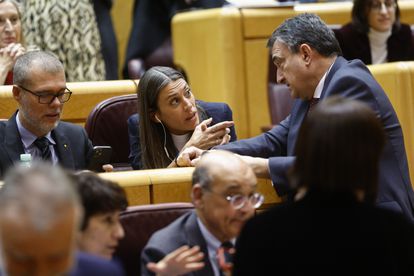At nine in the morning, Félix Bolaños entered the Senate chamber, escaping a crowd of journalists. “My mother, my mother, my mother!” exclaimed the Minister of the Presidency, one of the main interlocutors of the agonizing negotiation process maintained by the Government during the last hours to carry out the three decrees that it intended to validate this Wednesday. Not a word about the position that Junts would finally adopt. Nor from Podemos. But at that time the contacts with both parties continued between the corridors of the Upper House, where the debate was held because the Congress chamber was under construction. Bolaños then predicted an “intense” day. What came next far exceeded the minister's expectations.
Both Bolaños and the Secretary of Organization of the PSOE, Santos Cerdán, spent the entire morning coming and going on the phone, sneaking through the nooks and crannies of the Senate, unknown to many deputies. “But where is the bathroom?” exclaimed the president of Congress, Francina Armengol, wandering around bewildered during one of the breaks, in the middle of a session that ended up lasting 12 hours after one vicissitude followed another. With her cell phone in her hand, Bolaños even left the bathroom. Cerdán also spent most of the day on the phone, outside the chamber. The conversations must have been so intense that the socialist leader, sick and wearing a mask, covered his mouth with his hand to prevent his lips from being read even though he already had them covered. Socialist sources confirmed conversations “at the highest level” of Cerdán that took place while the debate was taking place.
The one who also left her seat was Miriam Nogueras. The Junts spokesperson was absent most of the time until she intervened in her turn to speak on the anti-crisis decree, the third text to be discussed, around 1:00 p.m. Even at that time, Junts' vote was unknown. The expectation was such that when the deputy went up to the podium, the intense murmuring stopped and even PP parliamentarians, such as Elías Bendodo and Miguel Tellado, put on the headset to listen to the simultaneous translation into Catalan, in an unusual gesture for the popular ones. It so happens that in the Senate there were no subtitles on the screens to follow the interventions in co-official languages, as is the case in Congress. At the end of Nogueras's intervention, the deputies wore puzzled faces: the Junts spokesperson remained uncertain about her vote.
Yolanda Díaz also moved to try to ensure that her decree did not falter. The second vice president and Minister of Labor was waiting for Junts' yes or abstention to try to finish the negotiation with Podemos. The Secretary of State for Employment, Joaquín Sánchez, dependent on the Labor Ministry, did not leave his team behind for even a minute. Her department was affected by one of the main obstacles that Díaz was trying to overcome: Podemos was reluctant to vote in favor of her decree, considering that it represents a “cut” to unemployment benefits for those over 52 years of age. “We are not going to give in on that!” was heard in the circles of the Ministry of Labor.
Although Sumar did not share the “essence” of the criticism, Joaquín Sánchez summoned Podemos in a Senate room to try to save the decree “out of responsibility,” including the requested amendment. But Podemos deputy Noemí Santana did not appear, according to sources in Díaz's cabinet. Shortly afterwards, around 3:00 p.m., the leader of Podemos, Ione Belarra, confirmed to the media one of the bombshells of the day: they voted against the Labor decree and brought down the text.
What affects the most is what happens closest. So you don't miss anything, subscribe.
Subscribe
Podemos argues that they had notified the Government that they would cast their vote at 2:30 p.m. And that they received the communication of the meeting minutes before that limit after days in which Labor flatly refused to incorporate their request. In any case, Belarra's party did not trust that the change would be incorporated as an amendment because during the processing of the bill the votes of other parties such as Junts and PNV, “not leftist”, would be necessary, according to party sources.

Meanwhile, the leader of the PP, Albert Núñez Feijóo, watched the bulls from the sidelines waiting for the Government to receive its first major setback. The head of the opposition entered the chamber only when deputies from his party intervened and mocked the Executive in the corridors of the Senate. “Valle Inclán is writing his next novel today. This is a grotesque thing,” said Feijóo, who insisted that Carles Puigdemont was exhibiting from Waterloo his ability to “humiliate” the Government by keeping it in suspense all day.
The debate ended with the discussion of the two amendments to the entire amnesty law registered by PP and Vox. Armengol then took a ten-minute break before issuing the verdict. The Board of Spokespersons decided that the vote on the three decrees, the spending ceiling, the deficit path and the Vox initiative would be done electronically from 9:30 a.m. to 3:00 p.m. because the Senate does not have 350 seats to be able to vote by pressing the button, since the number of senators is less. The Popular Party reported during the morning that 30 deputies in its group had computer problems in casting their vote because the system collapsed, according to Congress sources, which decided to extend the deadline until 3:30 p.m. so that “no one” would be left without voting.
Around 6:00 p.m. Armengol announced the results of the telematic voting after receiving them from one of the Congress lawyers in a red folder. And then another surprise. Junts had not voted in what was actually an abstention and facilitated the decree bus, but there was a t
ie in the anti-crisis category due to the mistake of Sumar Pisarello's deputy. To resolve this tie, the president of Congress announced that the vote would be repeated electronically. But the PP spokesperson, Miguel Tellado, stood up and made use of his power to request that they be repeated but through the call system. That is to say, by voice of each deputy from his seat, as his amendment to the amnesty law had also occurred. Pedro Sánchez had not attended the Senate all day. Not even at that moment.
Faced with the new surprise, Armengol hurriedly consulted with the senior lawyer what to do about it. He reviewed the pages of the regulations looking for the solution: the decision was to effectively repeat the votes by call but at 7:30 p.m., about an hour later. Shortly after, the President of the Government entered the corridors of the Senate. Then came the vote and the anti-crisis package went ahead after a heart-stopping day. At around 8:45 p.m. Sánchez stood up from his seat with a huge smile amid applause from his people while Minister Óscar Puente patted Santos Cerdán on the face. The President of the Government had once again emerged triumphant and saved the furniture at the last moment. Although this time not completely.

Subscribe to continue reading
Read without limits
_
#backroom #12hour #super #plenary #session #heartstopping #negotiation #devilish #vote #give
